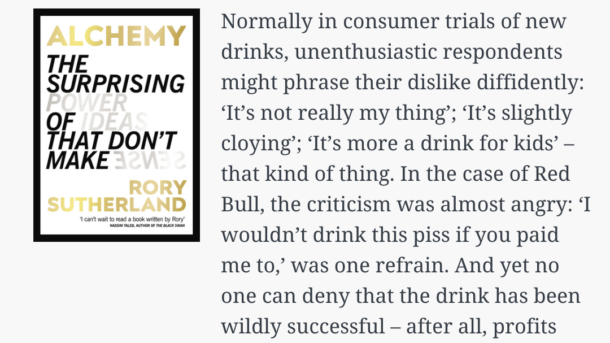Imagine that you are sitting in the boardroom of a major global drinks company, charged with producing a new product that will rival the position of Coca-Cola as the world’s second most popular cold non-alcoholic drink.* What do you say? How would you respond? Well, the first thing I would say, unless I were in a particularly mischievous mood, is something like this: ‘We need to produce a drink that tastes nicer than Coke, that costs less than Coke, and that comes in a really big bottle so people get great value for money.’ What I’m fairly sure nobody would say is this: ‘Hey, let’s try marketing a really expensive drink, that comes in a tiny can . . . and that tastes kind of disgusting.’ Yet that is exactly what one company did. And by doing so they launched a soft drinks brand that would indeed go on to be a worthy rival to Coca-Cola: that drink was Red Bull. When I say that Red Bull ‘tastes kind of disgusting’, this is not a subjective opinion.* No, that was the opinion of a wide cross-section of the public. Before Red Bull launched outside of Thailand, where it had originated, it’s widely rumoured that the licensee approached a research agency to see what the international consumer reaction would be to the drink’s taste; the agency, a specialist in researching the flavouring of carbonated drinks, had never seen a worse reaction to any proposed new product. Normally in consumer trials of new drinks, unenthusiastic respondents might phrase their dislike diffidently: ‘It’s not really my thing’; ‘It’s slightly cloying’; ‘It’s more a drink for kids’ – that kind of thing. In the case of Red Bull, the criticism was almost angry: ‘I wouldn’t drink this piss if you paid me to,’ was one refrain. And yet no one can deny that the drink has been wildly successful – after all, profits from the six billion cans sold annually are sufficient to fund a Formula 1 team on the side.
Just thought I’ll go with this opening story for one, as I think this passage is symbolic of the book’s key message. Many times, intuitive logical reasoning fails us when we’re trying to get people to buy your shit. The reasoning behind is that none of us truly behaves in logical ways, and so why would relying on reason to make marketing decisions necessarily yield the best results?
The anecdote in question, was something that I have always struggled with when I wanted to figure out ways to market a product. Sometimes, giving your customers what they seemingly want doesn’t actually result in better results. This also reminds me of the story where Coca Cola tried to change the taste of their product in 1985 and supposedly had a superior product based on blind taste tests. However, when they launched the new recipe, it resulted in thousands of complains, lawsuits and they eventually switched back to their old formula in just a couple of months.
The main reason why we choose to buy certain products sometimes can be down to emotion, loyalty, or some other intangible factor that cannot easily be explained by logic. In the case of beverages where taste is a subjective experience to every user, I believe the emotional factor is ever more salient. This book aims to shed more light on that and how we can possibly build great brands.



